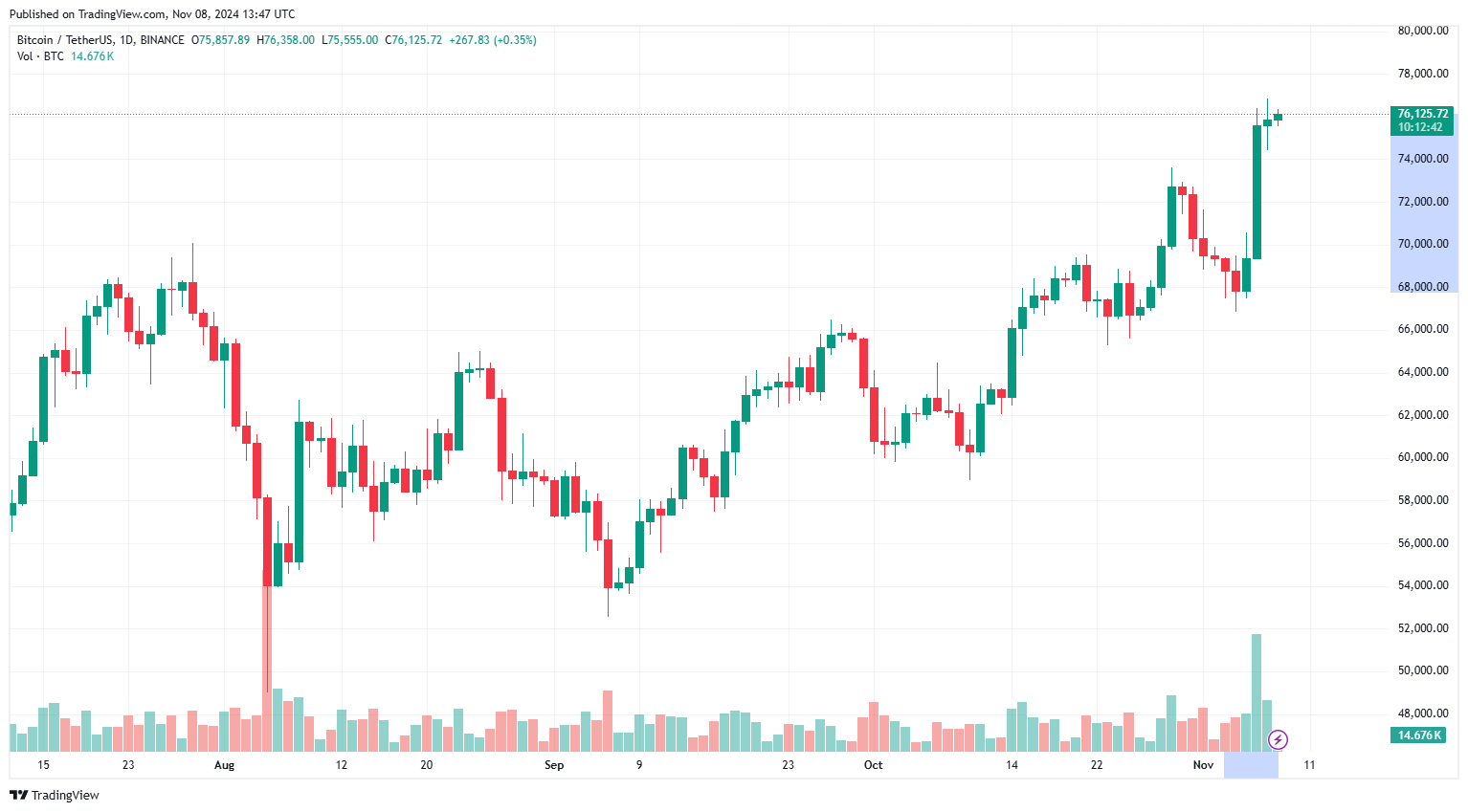Bitcoin reaches $76K: Türkiye’s crypto adoption, regulations and growth
 Türkiye Crypto Journey
Türkiye Crypto Journey
Türkiye ranked highest globally in crypto adoption as of June 2023, according to a survey by GlobalWebIndex (GWI). Around 24% of Turkish respondents reported investing in crypto assets, outpacing countries like South Africa and Brazil, where the figure stands at 20%.
Bitcoin was the first cryptocurrency to work without any central control. Instead, it relies on a network of users, or nodes, who check transactions through cryptography. These transactions are then recorded in a shared public ledger called the blockchain, keeping everything transparent and secure without needing a central authority.
A blockchain is a decentralized ledger that continuously expands by adding records, known as blocks, which are securely connected using cryptographic hashes. Cryptocurrency is a digital asset that operates within this distributed ledger system.
CoinGecko’s third-quarter crypto industry report highlights key trends and performance across different sectors of the cryptocurrency market. In the report, the cryptocurrency data platform noted that despite macroeconomic volatility, the total crypto market cap remained flat, closing the quarter at $2.33 trillion. Market activity saw fluctuations, with bitcoin strengthening its dominance while ethereum lost market share.

After the United States elections, bitcoin price hit $76,000 on Friday and this price is an all-time-high for bitcoin.
Türkiye is a good market for the crypto industry due to global and local economic conditions pushing people toward high-risk investment instruments. These investments often rely on volatility, leading people to choose assets with high profit and loss potential to protect their money’s value.
Let’s now focus on Türkiye’s journey with crypto adoption, particularly from a legal perspective. Türkiye has gradually developed cryptocurrency regulations to ensure financial stability and safeguard investors.
Ban on using crypto for payments (April 2021)
The Central Bank prohibited the use of cryptocurrencies as a payment method, though trading on exchanges remained legal. This regulation published in the Official Gazette of the Republic of Türkiye, reflects the country’s cautious stance on using crypto in daily transactions.
Türkiye’s approach to regulating cryptocurrencies took a significant step on April 16, 2021, with the introduction of the “Regulation on the Prohibition of Payments with Crypto-Assets”, published in the Official Gazette.
Issued by the Central Bank of the Republic of Türkiye (CBRT), this regulation bans the use of crypto assets as a form of payment in legal transactions. However, it is important to clarify that the regulation does not place any restrictions on the trading of cryptocurrencies on either local or international exchanges.
The regulation solely focuses on preventing the use of cryptocurrencies as a substitute for traditional currency in everyday transactions, such as shopping or purchasing goods and services. The regulation aims to limit the use of crypto assets strictly to trading activities, rather than allowing them to function as a medium of exchange for routine commercial transactions.
On the other hand, a key aspect of this regulation was its introduction of a formal definition for “crypto assets” within the Turkish legal framework. Article 3 defines crypto assets as digital assets created using distributed ledger technology or similar systems and circulated over digital networks. However, these assets are not recognized as money, fiat currency, electronic money, payment instruments, or capital market instruments.
The regulation specifically prohibits:
- The use of cryptocurrencies, whether directly or indirectly, for payments.
- Offering services that enable the use of crypto assets in payment processes.
- Payment and electronic money institutions from acting as intermediaries for platforms that manage the trading, storage, or transfer of crypto assets.
- Payment service providers from developing business models that involve the use of cryptocurrencies in payment services or electronic money issuance.
Following the enactment of this regulation, crypto-asset service providers were officially categorized as “obliged parties” under Türkiye’s regulations aimed at preventing money laundering and the financing of terrorism. To strengthen this framework, the Financial Crimes Investigation Board (MASAK) released guidelines specifying compliance requirements for crypto service providers to combat financial crimes.
These regulatory measures were put in place amid growing concerns about the potential misuse of cryptocurrencies for illegal activities due to their decentralized and often anonymous nature. Additionally, they were part of Türkiye’s response to a major crypto fraud case in 2021, where approximately 400,000 investors were defrauded of over $2 billion, underlining the urgency for stricter oversight in the crypto industry.
Regulation of crypto-asset services providers (July 2024)
On July 2, 2024, Türkiye introduced significant changes to its crypto regulations through the improvement of the Capital Markets Law No. 7518, published in the Official Gazette. This amendment brings crypto-asset service providers under the regulatory purview of the Capital Markets Board (SPK), aiming to ensure tighter oversight of the industry which means this regulation is mostly exchanges or other organizations that buy, sell and store cryptocurrencies.
Türkiye’s regulatory framework took another step forward on July 2, 2024, with the implementation of the Capital Markets Law Amendment No. 7518, published in the Official Gazette. This regulation mandates that all crypto-asset service providers, including those engaged in buying, selling, transferring, or storing crypto assets, now fall under the supervision of the SPK.
The law’s primary objective is to regulate crypto-asset activities, align with global standards, protect investors and reduce the risk of financial crimes. It establishes clear guidelines for existing and new service providers, requiring them to either comply with the new regulations or stop their operations in Türkiye.
A key aspect of this regulation is the inclusion of crypto-asset service providers under the definition of “obliged parties” as per Türkiye’s Anti-Money Laundering (AML) laws.
Specific requirements under the new regulations are:
• Licensing and compliance: All existing service providers operating as of July 2, 2024, must apply for a license by Aug. 2, 2024. They are required to submit specific documents to the SPK to continue their operations or declare their intention to exit the market within three months. New service providers must obtain approval from the SPK before starting their operations.
• Mandatory notifications for liquidation: Providers opting for liquidation must inform the SPK and notify their customers via multiple channels, such as email or SMS, ensuring a smooth transition by Oct. 2, 2024.
• Restrictions on foreign platforms: The regulation also targets foreign crypto platforms, requiring them to halt all activities aimed at Turkish residents by Oct. 2, unless they obtain the necessary licenses. This includes any foreign platform that uses the Turkish language or engages in marketing activities targeting Turkish users. For instance, Binance Global and other major crypto exchanges have decided to discontinue their language services for users in Türkiye. They have officially notified their customers through announcements, emails, and SMS, stating that “The Turkish language option on the Binance.com website and Binance App will no longer be available as of 2024-09-27.”
• Ban on crypto ATMs: The regulation also prohibits the operation of crypto ATMs in Turkiye that enable cashing out or transferring crypto assets. These devices must cease operations by Oct. 2.
The SPK’s new measures are designed to enhance transparency in the crypto market, protect consumer rights, and ensure that all crypto-asset service providers operate within a clear legal framework.
These changes reflect Türkiye’s proactive stance in regulating the rapidly growing crypto sector, addressing previous incidents of fraud and ensuring a safer environment for investors and consumers alike. These measures underscore Türkiye’s commitment to regulating the cryptocurrency sector effectively.



